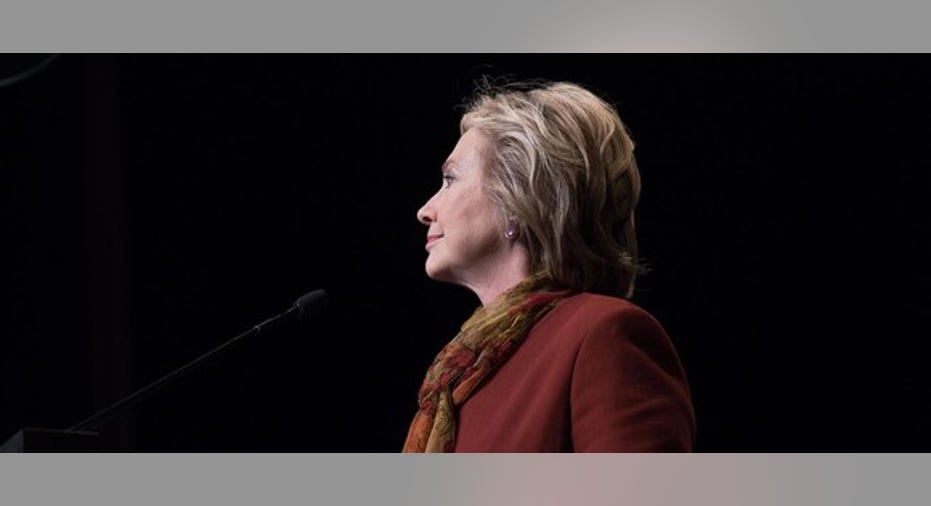3 Things Hillary Clinton Just Said About Your Taxes

Voters have seen plenty of surprises during the 2016 presidential campaign race, but the issues that matter most to them are still the key to how they'll vote come November. One of the most important issues facing many Americans is their taxes, and in Sunday's debate, both candidates talked about the changes they would make in order to make the U.S. tax system fair for all. In particular, Democratic candidate Hillary Clinton offered a few key points that shed some light on how she thinks the wealthiest Americans can pay their fair share in taxes.
Image source: Clinton campaign website.
1. Keep taxes unchanged for most taxpayers.
Clinton has said that she wants to restore basic fairness in the tax code, and she's made it clear that imposing more taxes on high-income taxpayers is the way to accomplish it. As Clinton said Sunday night, "We have got to go where the money is, and the money is with people who have taken advantage of every single break in the tax code."
As you'll see below, most of the changes that Clinton has proposed target those with incomes of $1 million or more. Yet a few, such as changing long-term capital gains rates and limiting the value of itemized deductions for high-income taxpayers, could potentially affect those who make far less than $1 million. With her statement, Clinton narrowed in on the quarter-million-dollar mark as a dividing line for determining the future course of tax policy.
2. Implement the Buffett rule -- with a twist.
Clinton once again affirmed her support of the Buffett rule. The name comes from investor Warren Buffett, who has said in the past that he typically pays a lower tax rate than his secretary on their respective incomes. Buffett's assertion takes into account not only individual income taxes but also the regressive nature of Social Security taxation, which imposes a sizable payroll tax on the first $118,500 of compensation but then disappears for higher-income taxpayers.
Clinton has said in the past that she would impose a 30% minimum tax rate on those who earn $1 million or more. Last night, she also repeated her call for an additional surcharge on those earning $5 million or more, adding 4 percentage points to marginal tax rates. Overall, Clinton believes that focusing higher taxes on the top end of the income spectrum is appropriate because of her view that gains in income have gone disproportionately to higher-income taxpayers.
3. Eliminate the carried interest provision.
One rare area of agreement between Clinton and Trump is in eliminating the carried interest provision. The much-publicized tax break offers capital gains treatment to that share of profits that general partners of private investment funds take as contractual compensation for their services. The net result is that the individual managers who work for the private equity and hedge funds that take advantage of carried interest pay favorable tax rates on that portion of the money they receive for their work, even though other Wall Street professionals doing similar work have salary and bonus income taxed at ordinary rates.
Clinton would treat carried interest as ordinary income, and given that many money managers are among the high-income echelon that her tax proposals target, they would end up paying the higher tax rates found elsewhere in the candidate's proposals. Opponents of eliminating carried interest note that unlike those who get paid salaries, taking a share of profits leaves them at risk of receiving nothing if the fund doesn't earn a profit. That makes the individual managers resemble business owners risking their capital on the success of their work, and many such business owners can claim favorable tax treatment when they do well. Yet others still see the money as essentially being compensation, making ordinary income treatment appropriate.
Overall, Clinton has taken the position that raising tax rates is not only fair will create additional revenue that the government can use to create good-paying jobs, improving the economy and making it more competitive. Whether you agree or disagree, Clinton has made that idea of basic fairness the centerpiece of her tax strategy, and taxpayers can expect future tax changes to follow that general ideology if Clinton wins the election in November.
The $15,834 Social Security bonus most retirees completely overlook If you're like most Americans, you're a few years (or more) behind on your retirement savings. But a handful of little-known "Social Security secrets" could help ensure a boost in your retirement income. For example: one easy trick could pay you as much as $15,834 more... each year! Once you learn how to maximize your Social Security benefits, we think you could retire confidently with the peace of mind we're all after.Simply click here to discover how to learn more about these strategies.
Try any of our Foolish newsletter services free for 30 days. We Fools may not all hold the same opinions, but we all believe that considering a diverse range of insights makes us better investors. The Motley Fool has a disclosure policy.



















